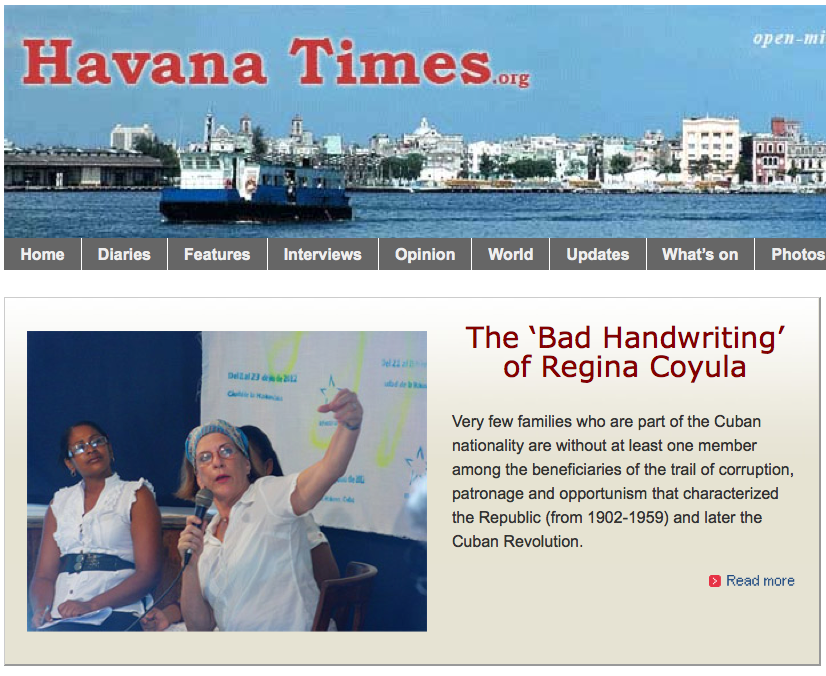
August 1 2012
English Translations of Cubans Writing From the Island
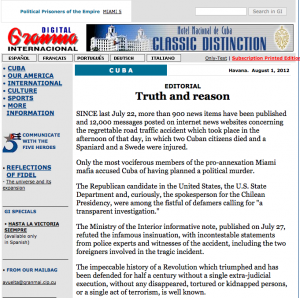 The recent editorial by the newspaper Granma clearly defines the mediocrity and poverty of thought of a system that now howls desperately at its approaching end. The text is an apology to the cynicism of the elite and those who serve it, who try to discredit and silence the independent voices that spring from Cuban society, and so conceal their total debacle.
The recent editorial by the newspaper Granma clearly defines the mediocrity and poverty of thought of a system that now howls desperately at its approaching end. The text is an apology to the cynicism of the elite and those who serve it, who try to discredit and silence the independent voices that spring from Cuban society, and so conceal their total debacle.
It is outrageous to see that the same government and the same criminal characters who instituted the firing squads and the long sentences in subhuman conditions as a way to maintain the terror, who ordered the repudiation rallies and beatings, attaching the people’s name as the author of these abominable acts, try to present themselves before Cuba and the world as paradigms of honesty and virtue.
The country lies in ruins and they don’t care, they display not the slightest dignity. They want to stay until the last moment, at any price, even provoking civil violence, seeing their allies as mere objects for their use. Fidel Castro did it at the Moncada Barracks attack when he supposedly lost his way in Santiago de Cuba, a city he knew very well, while other assailants fought and were killed. Raúl Castro did the same thing at the battle of Marcos Sánchez, in that now distant 1958, when cowardly and shamefully he fled, leaving behind all his troops.
These two characters keep the country in ruins. A constantly rising number of Cubans are literally crushed to death in the collapses of their disastrous homes, while Castro descendants assume the right to continue to plunder the nation of its funds, without rendering an account to anyone.
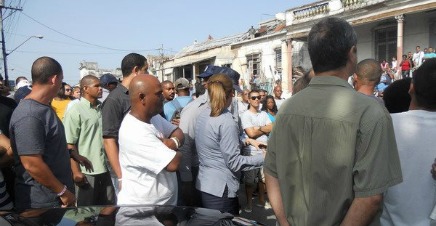
They and their sidekicks claim that we Cubans destroy each other like mad dogs, trying to sell ever more dearly the disaster they have provoked in our nation, they are insatiable, they are beings who profess an utter contempt for humanity, tolerance, humility, for our land.
Those who launched a rabid mob to beat people on the morning of July 24 during the funeral of opposition leader Oswaldo Payá, are the same ones who will give the order to shoot into a defenseless crowd, the same who prefer to drown thousands and thousands in a bottomless sea, rather than accept their ignorance and decay.
Hopefully the peons who form a part of and who cooperate with this nefarious machinery will begin to understand, for the good of all, that there is no action without consequence and that the winds are beginning to blow in favor of the truth.
1 August 2012
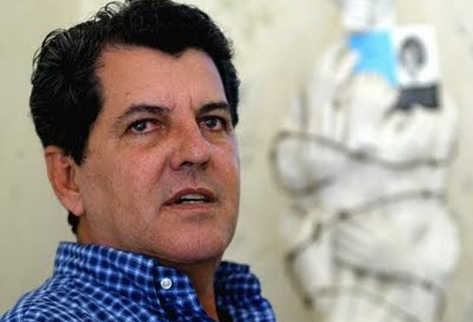 It was another summer Sunday, but in 1969. Oswaldo and I, seated on the double bunk we shared, commented that morning about the biography of Albert Einstein that he was proposing to read. Suddenly bursting into the barracks was an official from CIM — military counterintelligence — who was assiduously visiting our battalion of the “Military Unit to Aid Production” (UMAP*).
It was another summer Sunday, but in 1969. Oswaldo and I, seated on the double bunk we shared, commented that morning about the biography of Albert Einstein that he was proposing to read. Suddenly bursting into the barracks was an official from CIM — military counterintelligence — who was assiduously visiting our battalion of the “Military Unit to Aid Production” (UMAP*).
After saluting us he took the book in his hand, flipped through it and said to me, “This is enemy literature, it’s about making the atomic bomb the Yankees dropped on Japan and with which they blackmailed the world.”
We were stunned and, later recovering from our surprise, we spent a long time trying to explain to the official who the great German physicist had been. Some recruits were standing around us listening to the exchange of opinions. When the official left, Payá exclaimed, smiling, “At least we saved the book.”
It is this image of the young man, intelligent and cheerful, that I will always remember of those days when we shared three years of Forced Military Service on the Isla de La Juventud. Along with us were seminarians, like the current Chancellor of our Catholic Church, José Ramón Suárez Polcari, Padre Troadio, Padre Norberto, among others of different religious denominations. Some who had left the seminary, like Ricardo Fernández, all mixed into an amalgam which the repressive forces of the Cuban regime denominated the disaffected to the system. There are many anecdotes in which, one way or another, were involved.
Now, more than forty years have past since we met, years of getting together, sharing, sometimes agreeing and sometimes disagreeing, and I agree with the words of Pastor of the Church of St. Saviour of the World, in tCerro, when in his homily for Oswaldo he said that all his actions and human conflicts were marked by love. Love of God, his Church, Jesus, his family, country, and friendship. We used to like to joke together, saying that one day we find each other in Nirvana. I hope if the Lord is willing, we will meet again. Rest in peace.
*Translator’s note: UMAP was a program of concentration camps for religious believers, homosexuals and others.
July 31 2012
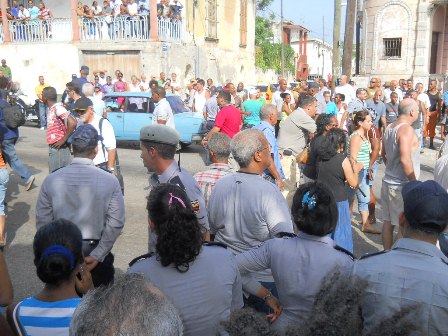
On the afternoon of Monday, July 30, we could watch on Cuban TV a few edited minutes of a press conference held by one of the two survivors of the event that claimed the life of Oswaldo Payá.
Aron Modig presented himself as a Swedish citizen affiliated with the Christian Democratic Party in his country. He didn’t know when he would be able to leave Cuba and more than seven times he repeated that he didn’t know that the activity he undertook was illegal. Only when he spoke with the police was he forced to accept his delicate situation. It’s difficult for a foreign citizen to understand that the Universal Declaration of Human Rights is illegal and a State that considers the exercise of freedoms to be punishable offenses.
Yes, even though it seems incredible in Cuban peaceful political opposition is illegal. The Revolution is a kind of “religion” that purports to be irrevocable. And the issue of money, in an impoverished country and whose only permissible donor would be the State or the licenses it grants, reserving the right to discriminate between good money and bad, revolutionary money and counter-revolutionary money, is the most bandied about by this mafioso organization that ensures power to a single Party and its leaders such as State Security.
And this issue of money is “the great crime,” the “great proof” to discredit the authenticity of libertarian aspirations, anti-Castro yearnings of the Cuban people or of a displaced part of an oppressed people. Perhaps it should also saw that like all previous models, to be a dissident in a Communist country, ruled by a dictator and his disciples, is to have the moral character to recover, to become a moral agent, so that is also what it means to be anti-Castro or libertarian in the Cuba of today.
Once again the BBC echoes the government’s interests. We see again their correspondent defending this demented style of procuring social justice: talking about the graduation of doctors, and “solidarity among people” and leaving in the shadow what matters: the lack of rights for citizens, the political imprisonment, robbery, kidnapping, political assassination on the part of the authorities.
But the correspondent apparently animated to defend the Utopia of the Caribbean Island with more doctors per capita launches his question about whether these opposition activities, to which the Swedish Christian Democratic Party– which is not just any party and seems to be the equivalent of the Christian Democratic party — wanted to donate 4,000 euros, which does not make him a troublemaker as would have been realized in any other country.
Cheap rhetoric from the correspondent of a foreign press agency who refused to be objective and to stand on the side of those repressed by power. How many countries are there in the world who face the same situation as Cuba? Including having a foreign press agency like the BBC, who instead of reflecting the complex situation of the country, serve to support before public opinion a perspective of reality that in other countries would be considered abnormal, and to defend one of the most perverse regimes in the history of our time.
Aron Modig looked scared, and besides having gone through a very violent event he was still in the hands of the political police. We can guess the situation he and Carromero — who was driving the car — find themselves in. The Hospital must have been guarded, indeed, surround by police and State Security agents, and they would have been taken to be interrogated by those agents (very similar to those of the East German Stasi who offered a lot of courses in Cuba), and they would have been made to understand that Cuba is a different country, a lost place, where rights are forgotten. And surely this press conference and the declarations made figured strongly in his fate.
This seems sufficient to me to hold the suspect for the death of Harold Cepero and Oswaldo Payá. Luckily I still believe in life and death, there is still a God in the Universe. Lately I am reading the Book of Revelations which helps me survive any despair.
July 31 2012
 On the block where I live was, in another era, a haven of peace to walk along, protected by the shade offered by its trees, all, one by one, victims of some neighbors who were greatly annoyed by the dry leaves they shed, without caring anything about the cans and empty cartons, cigarette buts, that they themselves strewed across the sidewalks and flowerbeds.
On the block where I live was, in another era, a haven of peace to walk along, protected by the shade offered by its trees, all, one by one, victims of some neighbors who were greatly annoyed by the dry leaves they shed, without caring anything about the cans and empty cartons, cigarette buts, that they themselves strewed across the sidewalks and flowerbeds.
A couple of days ago the last tree fell, a tree that gave us shade, although not on the sidewalk but next to it within the grounds of a kindergarten. It was attacked on several occasions by a neighbor who threw oil on it, with the clear intention of drying it up. The tree survived, because the sap continued to circulate through the trunk that was beyond the reach of this predator. But weakened in the extreme, finally it fell on the perimeter fence, damaging it and blocking the way, in its great leaning toward the pavement. The mastermind of this destruction looked for a way to get an Electric Company brigade to come and cut it down, since its fall affected the wires.
This tree could have been saved by tying it back and returning it to its position, but this would have been in a civilized and well organized country, where institutions exist who work to protect them, not in ours. This was simply a chopping down and leaving it in a dangerous position. Today, finally, a brigade with an electric saw came and cut it into pieces. The brigade came, sawed and retired, as always, taking the large pieces of the trunk but leaving lots of branches and leaves scattered on the sidewalk.
One tree less, in a country where the sun punishes all of us equally. Now nothing more can come to shelter us in its shadow.
July 31 2012
July 31st marked Translating Cuba’s first day on which we exceeded 1,000 readers in a single day:
These are “real” readers… not bots and worms (gusanos!). And not “hits” (which were over 25,000 for the day, which doesn’t mean much).
Total readers for July on Translating Cuba (English) were 25,000 (600,000 hits).
In addition, in the past we’ve had an equal number, or more, on the bloggers’ individual English language blogs (but as that is more complex to count… blog by blog by blog… we won’t speculate here).
Year-to-date:
142,000 readers
3.9 million hits
 Six years. So much and so little has happened. Of the seven names mentioned in that “Proclamation of the Commander in Chief to the People of Cuba” only three remain unharmed. As if the text was not only news of Fidel Castro’s illness but also a curse that would fall on those mentioned. José Ramón Balaguer, whom the ailing leader appointed to head up the National and International Public Health Program, would leave this branch of the ministry in mid-2010. Faced with the death from starvation and cold of dozens of patients at the Havana Psychiatric Hospital, the unconditionally loyal functionary was passed to another post, perhaps to avoid ending up in court. Another of those mentioned, Carlos Lage, dramatically lost his position as Secretary of the Executive Committee of the Council of Ministers. Assumed by many analysts as a possible successor to the Cuban “throne,” his ouster was a hard blow to those who were betting on a reformist line within the government itself.
Six years. So much and so little has happened. Of the seven names mentioned in that “Proclamation of the Commander in Chief to the People of Cuba” only three remain unharmed. As if the text was not only news of Fidel Castro’s illness but also a curse that would fall on those mentioned. José Ramón Balaguer, whom the ailing leader appointed to head up the National and International Public Health Program, would leave this branch of the ministry in mid-2010. Faced with the death from starvation and cold of dozens of patients at the Havana Psychiatric Hospital, the unconditionally loyal functionary was passed to another post, perhaps to avoid ending up in court. Another of those mentioned, Carlos Lage, dramatically lost his position as Secretary of the Executive Committee of the Council of Ministers. Assumed by many analysts as a possible successor to the Cuban “throne,” his ouster was a hard blow to those who were betting on a reformist line within the government itself.
And what to say about Felipe Pérez Roque? Who in that announcement – read several times on the night of July 31, 2006 – was assigned to manage the health, education and energy programs. Only twenty months had passed and already he was accused of having become addicted to “the honey of power.” The spell of the Proclamation was having a contrary effect… instead of sealing the ascent it certified the fall. The same finger that had pointed out these men as faithful choices to carry on his work, later identified them as traitors. The old maxim that proximity to power is as lucrative as it is dangerous, exemplified in a short space of time. Another of the mentioned, Francisco Soberón, president of the Central Bank, would also be replaced; he would leave by the back door to write his memoirs, some said; to avoid public punishment, said others.
Only three of the names mentioned in that foreboding text remain untouched. One of them is José Ramón Machado Ventura who has become the second in command. Nor has Estaban Lazo been ousted, because he learned well the lesson not to let his own light shine too brightly. And the third of the “survivors” is Raúl Castro himself. Principle beneficiary of the “proclamation/will,” the former Minister of the Armed Forces also has been the most cursed. Because his account now carries not only his own sins but also those inherited from his brother: delayed reforms, massive layoffs, the invasive marabou weed that continues to run wild, cuts in the basic ration basket, and that damned glass of milk that never materializes on our tables – no matter how many times it is promised – along with a long list of et ceteras. It would not surprise me to hear a new proclamation any day now, in which the General-President delegates his duties to someone who carries the same name. The next damned president of our national history.
31 July 2012
The First Secretary of the Central Committee of the Communist Party, Raúl Castro, gave a speech at the main national event for the 26th of July celebrated in Guantanamo province. They might as well have re-broadcast a tape from the ’60s or ’70s, as the official discourse has changed very little since then. With the exception of the repeated invitation to the United States to talk and the bravado of the spirit of the call, trying to send a message to his own people that there are no problems, a government “Hakuna Matata” — No Worries — imported from Swahili, after a precipitous trip to Vietnam, China and Russia.
But what really set off many of the people listening — and not in a good way — was his blackmailing the workers: “(…) as long as there is not increase in production and in productivity, beginning with those tasks at hand, that can be achieved, such as food production to save billions of dollars on imports, there will not be any wage increases.”
He said nothing about the constant loss of purchasing power our salaries suffer every time they raise the prices on the products in the stores, on some services, and the electric bill. The law of the double standard that blunts the ability to distinguish that what isn’t advancing is the system.
I think the Cuban president’s speech was painful, trying to hide sensitive issues from the citizenry, who have been customarily ignored and neglected by the men in power in Cuba since 1959. Well I could also apply to myself the maxim I’ve used as a title to this appreciative brushstroke, but I firmly believe that the Cuban president-by-inheritance should incorporate the maxim that there are times when it’s better to keep your mouth shut.
July 31 2012
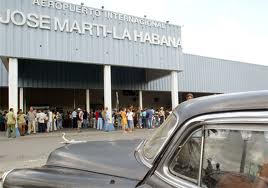 People are preoccupied with how to pay the tariffs at the airport, especially on medicine and food.
People are preoccupied with how to pay the tariffs at the airport, especially on medicine and food.
The new restrictions for travelers increase the tension on the island. “With the tax on food, there is less coming into the country, especially to Cuban families,” said Jesús Reyes, a 42-year-old Cuban, recently arrived from Italy.
Medicines are very important, because when some medication is needed that can’t be found on the island, a family member is asked to send it from abroad. Everyone knows about the “development” of public health in Cuba, so they are limiting the amount that enters for Cuban families.
As for food, this tax already existed but was suspended in 2008 because of the emergency caused by hurricanes Gustav, Ike and Paloma. Food was allowed to come in for free.
It seems the government now has the food supply guaranteed and can satisfy popular demand or simply that harder times are coming.
Translated by Regina Anavy
July 30 2012
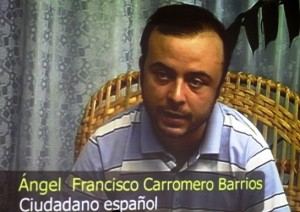
A lengthy editorial in Granma on Tuesday marked the beginning of legal proceedings for murder against Angel Carromero. The 27-year-old Spaniard, deputy secretary general of The People’s Party New Generation, Carromero was driving the car in which the regime opponent Oswaldo Paya and the activist Harold Cepero were killed. Also slightly injured in the crash was the Swedish citizen Aron Modig, who returned to his country this morning.
The accident happened near the city of Bayamo, in the eastern province of Granma. According to official experts and the testimony of three witnesses present, the driver lost control of the vehicle due to excessive speed and lack of attention, while driving on a road under repair. After sliding on the gravel surface of the highway, the Hyundai Accent in which they were traveling hit a tree on its left side, right at the back seat where the leader of the Christian Liberation Movement (MCL) was sitting.
Despite the detailed report provided by Cuban authorities and the statements of the two survivors, Oswaldo Payá’s family has doubts about what happened. On Monday, at a press conference before local and international media, Aron Modig reaffirmed that he had no memory of “there having been another car involved in this accident.” Subjected to several questions from the correspondents present, the president of the Christian Democratic Youth of Sweden (KDU) expanded on the reasons for his trip to the largest of the Antilles.
According to his answers, he was the bearer of some four thousand euros to deliver to the MCL, and was to provide advice to create a youth group of that organization. Visibly nervous and with brief responses, Modig apologized for not knowing in advance the illegal character of these actions.
A few hours later he was authorized to leave the island. No sooner had his plane landed on the old continent than he Tweeted, “European soil under my feet, I’m so relieved!” Family members as well as colleagues and friends of Oswaldo Payá are waiting, now that the Swedish politician can give his testimony more freely and without fear.
The Cuban government also released a video with statements from Ángel Carromero where he asked the international community to focus on getting him out of Cuba and “not using a traffic accident, that could have happened to anyone, for political reasons.” In his statement he emphasized that “no vehicle hit us from the rear… simply I was driving and I took the precautions of any driver which is to lightly touch the brake. The car lost control, I don’t remember signs.”
His words – without being self-incriminating – reflected a clear resposnisbily for what happened. He faces a legal process that could lead to a prison term of ten years. According to Article 177 of the current Criminal Code, “the driver of a vehicle who, breaking the laws and rules of transportation, causes the death of a person, incurs the penalty of privation of liberty for from one to ten years.” For its part, Section 183 refers to the appropriateness of sanctions taking into account “the degree of seriousness of the offense that produced the damaging event.”
By now the Spanish Embassy in Cuba has helped to hire an attorney to represent him, although the starting date of the trial has not been published. However, the Criminal Procedure Act provides for the possibility that, in exceptional circumstances, a summary process can be undertaken to reduce the length of time before coming to court.
The tone of the editorial in Granma points, also, to an increase in verbal escalation against the Spanish government. Asked about it, several opponents were alarmed about the fate of Ángel Carromero. Elizardo Sánchez, who heads the Commission on Human Rights and National Reconciliation (CCDHRN), told El Pais newspaper that “the more the government tries to clarify what happened, the more confusing it all is in relation to the accident that killed Paya and Cepero. For us the case is open until the truth is known and that includes the two witnesses being able testify without being under pressure. The CCDHRN is following this and from the first moment representatives of our organization have appeared at the scene.”
The political background of this case is no help to Ángel Carromero who, in the coming weeks, could become a bargaining chip for the Havana government vis-à-vis Madrid.
31 July 2012
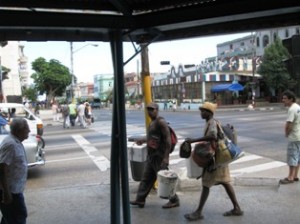 In spite of his osteoarthritis and mild senile dementia, Demetrio, 76-years-old, works as a night watchman at a primary school four nights a week. On his days off he get up before 5 AM to buy bread for the owners of various private cafes.
In spite of his osteoarthritis and mild senile dementia, Demetrio, 76-years-old, works as a night watchman at a primary school four nights a week. On his days off he get up before 5 AM to buy bread for the owners of various private cafes.
He is paid 480 pesos per month to purchase the bread, which combined with his 280 peso custodian’s salary and his 211 peso pension brings in a total 971 pesos a month. From this Demetrio takes 500 pesos to a currency exchange and buys 20 convertible pesos, or CUC’s, at the exchange rate of 25 pesos per CUC. With these CUC’s he then buys cooking oil, canned tomatoes, soap and other essential items.
With the remaining 471 pesos he must think up ways to pay for light and groceries. As a result there is no way this old man, burdened by ailments, can prepare two hot meals a day. This senior citizen no longer thinks about repairing his dilapidated apartment. Or about buying clothes or shoes. A widower of six years, his mission is simply to survive the harsh conditions of olive green socialism.
What concerns him most is being able to have four dishes for dinner: rice, beans, a salad or vegetable, and some form of protein, such as eggs, chicken, pork or catfish. Before going to bed, he prays that the Lord will take him. He wants to be together again with his wife.
Compared to Raudel, another one of Havana’sunfortunates, Demetrio is “rich.” Raudel is 73-years-old and sleepsat night when and wherever he can — a park, a doorway or an abandoned building. He is part of the herd of homeless vagrants whom the official press ignores.
Raudel is a “buzo,” as they call those who search through trashbins and garbage cans. He usually “dumpster dives” in Reparto Sevillano. In a frayed and dirty bag he collects “cucumbers” (liter and a half plastic bottles) and empty glass bottles. Those who sell vinegar and tomato concentrate pay him a peso for each bottle.
On a good day, Raudel can make 50 to 60 pesos — enough to pay 30 pesos for a small plate of rice, boiled vegetables and a slice of meat insome little privately owned cafe.
He spends the rest of the money on the drink of the forgotten — homemade rum manufactured from household alcohol filtered through a coil with industrial charcoal and horse shit.
Sometimes he gets a free meal when, while rummaging through garbage, he finds a can of food and the remnants of a meal. The “grand prize” is when he comes across an alarm clock that works, circuit boards for computers or televisions and foreign magazines in good condition. He knows people who will pay good money for these things.
He sleeps six to seven hours when and wherever he can. He lays out an old, dirty bedspread and goes to sleep, drunk and unwashed. The worst thing for a homeless Cuban is when the weather turns cold or a storm is approaching. Then Raudel pays 10 pesos to the custodian of a state garage who lets him sleep in a Russian truck.
Don’t even ask about his health. He doesn’t remember the last time he caught a cold. The future? He just lives day to day. He is happy when the trashcans have lots of plastic bottles and plenty of food, and Vincente has “train spark” (cheap rum) for sale. Everything else is nonsense.
Photo: The elderly are not the only ones living on the edge in Havana today. There are also men and women under 50, such as this couple photographed by Yuri Valle Roca at the corner of 12th and 23rd streets in Vedado.
July 30 2012
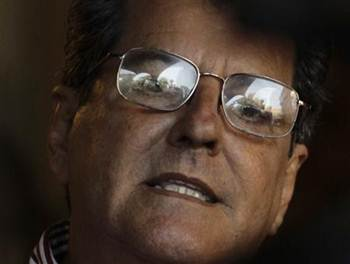
It’s still not a year since we suffered the death of Laura Pollán — in October — and in January that of Wilmar Villar, when mourning once again cloaked the feelings and spirit of the alternative civil society in Cuba. Oswaldo Payá, the most prominent of the opposition leaders inside Cuba, is physically absent from the atlas of the peaceful Cuban opposition.
He fought prompted by his Catholic faith, commitment and love for Cuba, and to win relevance for proposals ignored on the radar of the authorities, who only legitimate and recognize the rights and the participation in the national political life of their followers. But the dreams of liberty that encouraged his tireless work for the freedoms, human and civil rights of Cubans, will survive in the future of the nation.
I remember the concern between the years 1988 and 1990 because it seemed that they didn’t hear or value a discourse coming from political authenticity, and that left the members of the Christian Liberation Movement without the international recognition they needed and at the mercy of the arbitrariness of the Cuban authorities.
Oswaldo’s constant struggle came to fruition scratching at the dictatorial inconsistencies of the Cuba’s Constitution itself. The Varela Project and the program All Cubans, stand and are fused with the history of our country. Those who dig graves for the rights and freedoms of Cuba cannot bury Oswaldo’s example nor hide their totalitarian outrages of hatred and discrimination.
May our exemplary compatriot rest in peace.
![]()
July 31 2012
In less than a year the Cuban opposition has lost two of its most important leaders. On October 14 of last year life of Laura Pollán, the principal coordinator of the Ladies in White and the key figure in the release of the Black Spring prisoners, was cut short. A week ago a car crash, yet to be fully explained, claimed the life of Oswaldo Payá, founder of the Christian Liberation Movement.
These activists had great national and international recognition and their physical absence comes at a time when the dissidence is seeking new horizons. Hence, the need to analyze the scenario in which these deaths have occurred, and their potential impact on the immediate future.
On thing about which there is no doubt, is that the Cuban opposition on the Island is characterized by its peaceful nature and its renunciation of armed violence. It prefers to base its actions in political programs, documents demanding respect for Human Rights, street demonstrations, signs painted on facades, or simply open door meetings.
It behaves and manifests a much more democratic behavior than the government installed in the Plaza of the Revolution. Within the ranks of the dissidence there is a great variety of opinions with respect to possible paths and outcomes of the transition. Although some of these routes diverge, there are numerous points on which all converge. The urgent need for political, social and economic changes is the common thread that runs through civil society.
Calls to end the harassment of dissidents, arbitrary arrests and politically motivated prison sentences, form a part of this common agenda. In addition, everyone agrees that Raúl Castro’s government has exhausted its solutions to pressing national problems.
To talk or to overthrow
Although many schemes have been offered to classify the Cuban opposition, most of the studies have focused on the political leanings of the groups within it. Some analysts have established generational breaks, between the historical opposition and much younger actors. In practice, however, it is not political colors or age that differentiate most markedly the dissimilarities between dissident organizations. A key point is the legitimacy they assign to Raúl Castro’s government in their agendas and their proposals for change.
Some maintain that dialog with the authorities could possibly lead to a non-violent transition. Within this line of thinking are distinguished figures such as José Daniel Ferrer, president of the Patriotic Union of Cuba, who believes that “dialog is possible, but from a position of strength within civil society.”
Others dismiss any attempt to deal with the regime, basing their posture on the fact that it was not chosen by a vote of the people in free and direct elections. They see the Communist Party as a kidnapper of hostages with whom there should be no negotiations under any circumstances. To negotiate or to overthrow seem to be the two poles around which current opposition forces are defined.
The United States embargo also constitutes a parting of the ways that defines postures and platforms. Within the Island, many dissidents argue that economic restrictions must be maintained to strangle the government. They believe that allowing fluid trade with the United States or allowing Americans to travel to Cuba would be a source of fresh air that would strengthen the General-President. José Luis García (known as Antúnez), an opposition leader from the center of the Island is one of the main champions of this position.
The great challenge of the people
The Cuban dissidence is denied any opportunity to access the mass media. This significantly limits its ability to broadcast its proposals and political programs. Instead of allowing them even one minute in front of the microphone, Raúl Castro’s government uses television and the official press to accuse them of being “mercenaries in the pay of the Empire,” or “tiny groups of no importance.”
Human rights activist Elizardo Sánchez, opposition leader Martha Beatriz Roque, Catholic layperson Dagoberto Valdés, and the Ladies in White group have all been frequent targets of these media stonings. From different perspectives, these social actors could be key in the years to come, along with several socio-cultural projects such as Estado de Sats, directed by Antonio Rodiles, which even attracts people involved in State institutions. To support these activities with a constant dissemination of information becomes vital, hence the importance of independent journalists and alternative bloggers.
In the current scenario, Oswaldo Payá’s death raises the question of the future of the Christian Liberation Movement, which has many members throughout the Island. That this political force manages to survive the death of its founder will demonstrate the maturity of the entire Cuban opposition.
On the other hand, Raúl Castro has co-opted some of the points that made up the agenda of his political opponents. The aperture for small private businesses, the ability to buy and sell houses and cars, and the leasing of vacant land in usufruct, are all part of the measures implemented by the government in the last four years. Such a scenario obliges the opposition groups to chart new horizons and to redefine their proposals.
30 July 2012

The trashed cityscape reaches all the way to the gate of the parish, in the arid Cerro neighborhood. “The Savior of the World,” says the sign, so distant from the desert outside, beyond the gates. And one thinks, sleepwalking before sunrise: how poor any form of expression is in this country.
Dawn lingers on the park benches. The wake is supposed to start at 8:00 am, but there are only the little workers brigades, trying, on this Monday, to make up for decades of decadence: mowers, sprayers, trash collectors which, like the cop cars, pass and pass again without picking up anything. Everyone pretends it’s normal. It’s July 23rd and since yesterday Oswaldo Payá Sardiñas is dead.
They had promised it to him by word and with attacks, which he survived without even realizing it. It doesn’t matter with whom or how they fulfilled their promise. The idea is that there will be no Nobel Peace Prize in Cuba if Fidel Castro doesn’t win it first.
In a nightmarish sequence, Payá’s body, with his 60 years and thousands of signatures collected to reestablish our nation, fell so far away, a province whose name didn’t exist before the Revolution: Granma… An accident among strangers, Europeans with presidential ambitions who now will be anything but witnesses to the truth. A catastrophe without the protection of his brave and beautiful family, near this deadly Bayamo of the National Anthem.
It was the end of an era of a deceptive balancing act between the dissidence and the torturers: a declaration of war, although it seems exaggerated. And before so much horror, to the first curious we can only speculate what not even the Christ of the Democrats would dare to type here now: if it was carelessness or a paid assassin, if he died without suffering in the act, or perhaps looked with terror at the paramedics or the paramilitary or both, if he repented and assumed his martyrdom without the final temptation to betray himself.
The hearse traveled from the Oriente to Havana under an insulting sun without optimal conservation measures (or came secretly by air and the delay was only a ploy to pressure his family: living in Cuba is a lot like a police procedural). In the text messages we received and resent like automatons, the funeral was postponed until 11 am, and then to the secret hour permitted by State Security, already mid-afternoon when, amid the cellphones and tears, Oswaldo’s box made its entrance flush with the crowd.

By then the church sheltered almost a whole spontaneous congress of the Cuban opposition, from its media stars to the anonymous infiltrating agents of the last generation. The operation of control this time would play at not interfering with the ceremony and conceded everything his widow asked for (except the resuscitation of her love of 26 years). The irrepressible applause burst forth as the coffin advanced, in an unsuspected consensus from minutes earlier, erasing rancor and caudillos, displaying everyone’s best side before the memory of a good man who saw like no one else the promised land and, not to disprove the Bible, never managed to inhabit it.
It was not a private wake, but every time they felt invaded, the church’s young strongmen limited the labor of the cameras, cautioning us not to disturb “the suffering of the family.” A most dignified pain and more real than any other sentiment I remember in my life. But pain in public and not behind closed doors. That is, a pain that needed to be captured in all its beauty and brutality, in all its strength and fragility, in all its decency and denunciation, until it infected our sleepiest fibers, so that the world would understand the debacle that just occurred on the Island: another death the naturalness of which not even death itself trusts.
When the cries of “Freedom! Freedom” startled the pastor, with a nervous gesture implored the wife to calm the flock. And Ofelia complied in the name of Oswaldo, taking the microphone for the first time, and was instantly obeyed.
But perhaps her husband would have preferred that the music of throats and hands was never quelled, that explosion of sympathy that went from the intimate to the social, that instant plebiscite between indignation and revolutionary: it lacked nothing then to rip out the roots of resignation and appropriate the august corpse to take the Plaza by assault.
Perhaps the Christian Liberation Movement had never counted on such a quorum and this posthumously late, between grief and fear, compelled to say goodbye to their leader with more than incense and rosaries. An instant later, silence, it was obvious that we thousands gathered there will never play a leading role among the people, and the death of Oswaldo Payá Sardiñas will be diluted in the government statistics of the Traffic Division.
Foreign broadcasters crowded in line hoping for my cell phone, while I chronicled tweet by tweet trying to be the eyes and the heart of an ever more desperate diaspora. In exhaustive detail, exhausted. I took eleven million photos and video clips, approach the main altar where the coffin rested with wreaths of flowers and a flag, but I never joined the infinite line expressing condolences to his family for hours.
Perched dangerously above Oswaldo Payá Sardiñas, I saw his bruised face reminiscent of a fight, a trickle of blood without a biography flowing from his mind, his chest sunken under his Cuban shirt, his smile disappeared, his eyelids stoned, and I trembled before the remains whom I had admired from my ignorance and whom I defrauded before reading it by not signing the most virtuous Varela Project and in exchange, indeed, the socialist mummification of our Constitution, an anti-constitutional outburst with which Fidel Castro took his personal revenge on him.
His daughter Rosa María, whom I had heard on the underground radio like a miracle of courage and faith in human justice, emphatically imposed on me without knowing me, “I don’t want photos of my father’s face.” But I treasured much more than that. I had managed to cry softly, moved by so much helplessness among my contemporaries, infinitesimal beings when not infantilized, at the intemperance of a State incapable of communicating a single word to us, except those of our stigmatization by decree (and at this same time they humiliated the Payá Acevedo family with vicious vermin on the web, without a note of protest coming from the Catholic Church nor from any other denomination).
With the setting of the sun came the Eucharist and then followed the deepest midnight. I hadn’t eaten or drunk anything. I was tired and my clothes were drenched by the vile summer. My Nokia and Canon batteries had given out. I went home and looked at my mother, who still suspected nothing, and gave her a hug as if suddenly it was me who would never come home again. I don’t want my accident to catch me without having said I love you to those I love.
But totalitarianism is exactly that surprise, you can always be removed from their spaces: from the cradle to school to high school to the brigade to the hut to the desk to the prison cell to the firing squad wall to the ambulance to the chapel to exile to heaven to the pantheon.
I returned to The Savior of the World church and lay down on the Plaza Galicia’s benches, amid the sacred snores of some Ladies in White. Inside the temple a few crestfallen mourners slept. I felt unpunished, indolent, and wanted to take the flag off the coffin, this heroic rag shared by saints and soldiers. Cuba tired. Outside was the most beautiful morning. The ceiba trees, a fingernail moon, the damp chill misting the pale streetlights and my eyelashes: this time there were tears without crying, a salt trickle flowing from my backward mind. Why do I stay in this citizenless cenotaph? They make you want to flee and not be killed. But, as long as I am free of so much hopelessness, I was enamored of those few words dictated despotically be despair, and now I came back for more photos of her father’s soul.
Tuesday dawned, and not having breakfast or perhaps the Cardinal’s weather made me want to vomit. Jaime Ortega y Alamino demagogued that “the aspiration to participate in the political life of the nation is a right and a duty of a lay Christian,” and even dared to quote Pope Benedict XVI who, when in Havana, had time to greet tyrannical atheists but not a lay Christian democrat with the last name of Payá: “let no one be impeded from joining this enthralling work by the limitation of their fundamental freedoms.” I had already heard this quoted on the jail TV, in His Holy Manipulated Mass of the month of March, and with hundreds of Cubans jailed on a prophylactically Catholic basis, with the consent of his spokesman Orlando Márquez in the Communist Party newspaper named with the same six letter word of accidental death as that unfortunate province: Granma…

All ritual is reiteration. Botched, yawn. But at the end of the funeral liturgy she returned to speak, there, a sliver of unspeakable Cuban truth. Rosa María Payá spoke with more spirit than a half century of erudite fakers. She accused without panic, although she was preparing her own gallows. She left hatred outside her discourse like the testament of a twenty something in terminal danger. From the elementary particle, the divine word, wherein is incarnated the mute honor — the prostituted honor — of this nation. The bishops stared at the infinite, faceless, masks of glass of those who couldn’t throw even the final stone. And then her mother Ofelia Acevedo, with a manifesto that claimed the right to fight from the peaceful opposition to be free beings in Cuba and not to die in the attempt.
Minutes later, a few yards away, the rapid response mobs and the police beat dozens of those present who, for trying to accompany the coffin on foot, never made it to the cemetery. Nor to their homes.
Rather than narrating the standing ovation goodbye at the cemetery, I would like to end with the horror still coagulating over the surviving witnesses from the rental car where Payá and his young collaborator Harold Cepero died. From promising European politicians, Ángel Carromero and Jens Aron Modig have become victims of verisimilitude for life. Whatever they say at this time of mystery and misery, their declarations will now echo with intrigue, traps, torture. I affirm it with the sarcasm of my own involuntary sacrifice: if both of them were to agree now that a flying saucer with the initials INRI* bombarded them on leaving Bayamo, their alibi would sound more sincere and less vulturous.
We Cubans do ourselves in. Cuba buries us. I haven’t slept a wink since then. Insomnia is a very persistent thing. Rest in peace if you can, first president of the country who wasn’t. What’s wrong with us.
*Translator’s note: Cuba’s Foreign Ministry
From Diario de Cuba.
July 28 2012